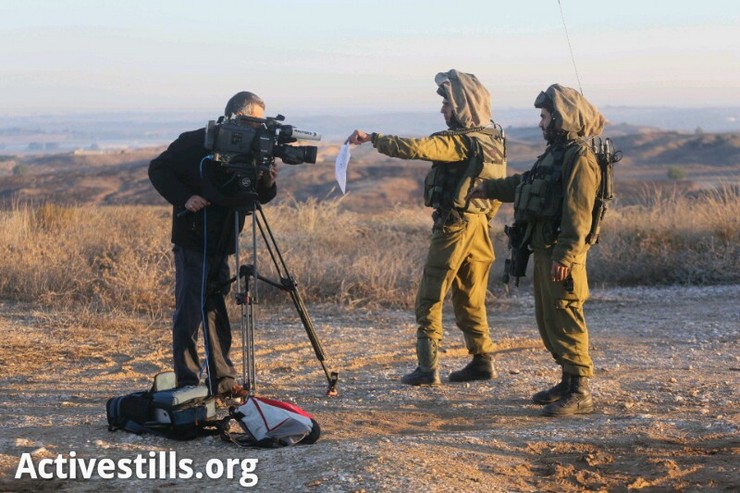While the number of articles submitted to the IDF Censor decreased in 2017, the percentage of articles that it fully or partially redacted went up.

Israel’s Military Censor outright prohibited the publication of 271 articles in 2017, more than five a week, and partially or fully redacted a total of 2,358 news items submitted to it for prior review. The latter figure amounts to roughly one redaction every four hours.
The figures, provided in response to a freedom of information request filed by +972 Magazine and the Movement for Freedom of Information, represents a rise in the percentage of articles the censor intervened in since the previous year. However, 2017 also saw a seven-year low in the number of articles that Israeli media outlets submitted to the censor for review.
Newspapers and traditional media outlets in Israel are required to submit articles and items relating to security and foreign relations to the IDF Censor for review prior to publication. The censor draws its authority from so-called emergency regulations, relating to a “state of emergency” that has remained in effect since the day Israel was founded. The censor may fully or partially redact an article.
In recent years, the censor has tried to expand the scope of its power to review information prior to publication into the online world, including by notifying independent blogs and web-based publications, like +972 Magazine, that they must submit certain articles for review. (Read more about censorship and +972.)
As first reported by +972 Magazine two years ago, the censor fully or partially redacts one out of every five articles submitted to it for review.
According to the new data provided for 2017, the censor fully or partially redacted 21 percent of the articles submitted to it in 2017 — more than one out of every five articles submitted to it for review. Between 2010 and 2017, it banned the publication of 2,298 articles.
The decision of which articles and news items are submitted to the military censor is made by media outlets and their editors on a case-by-case basis. However, once an article has been censored, the journalist and publication are forbidden from revealing what information was removed, or even to indicate that information has been redacted.
Last year saw a seven-year low in the number of articles submitted by news outlets for review by the censor (11,035), but it also saw a seven-year high (aside from 2014, during which the Gaza war led to a dramatic rise in censorship and security-related reporting) in the percentage of submitted articles that were fully redacted and banned from publication.
The military censor refused to provide the number of times it demanded media outlets take down or alter stories that had already been published without first being reviewed by the censor, data that it did provide two years earlier. In response to that earlier freedom of information request, it was revealed that 2016 saw a significant rise in the number of such incidents.
The military censor has not pursued any indictments for violating the country’s censorship laws in recent years. Chief IDF Censor Brig. Gen. Ariela Ben Avraham attributed the lack of enforcement to the military censor’s close relationship with publishers, who she said “[show] responsibility when addressing matters of national security.”
One of the lesser-discussed effects of the military censorship regime in Israel, however, is the self-censorship effect it creates when journalists and publishers know what is and isn’t allowed to be published, and where the defense establishment often effectively dictates the national security discourse.
“The number of stories submitted and handled by the censor is considerably affected by the number of security related events in a given year, as well as the media landscape,” Brig. Gen. Ben Avraham told +972 Magazine. Therefore, she suggested the public “not look only at these statistics when considering trends in the censor’s work.”
While other democratic and Western countries have official mechanisms for requesting that journalists refrain from publishing specific national security related information, Israel is the only one where journalists and publications are legally required to submit their reporting for review prior to publication, and the only one where that censorship can be criminally enforced.
The Israeli military censor’s powers also extend beyond news outlets. The censor also has the authority to review before publication and censor books and items in the State Archives.
In 2017, Israeli publishers submitted 83 books to the Israeli army censor, out of which only 31 were approved without any intervention; 53 books were partially redacted or edited after being reviewed by the censor. One of these is likely former Prime Minister Ehud Olmert’s recently published autobiography, which according to Israeli financial newspaper Globes was significantly redacted by the Censor. In 2016, out of 77 books submitted for review, 41 were approved while 36 were redacted or completely barred from being published.
The censor has also changed its approach to the State Archives in recent years. In the past, archive materials were available for public viewing as long as they remained within the Archive building, located in Jerusalem, and pending internal security clearance. In 2016, the Archive closed its doors to the public, moving its entire operations online. Because online documents are considered a form of “publishing,” as opposed to the previous arrangement where they were only “viewed,” the digitized documents fell under the censor’s purview.

A cohort of researchers and academics recently revealed that a small number of documents that had previously been made available to the public have recently been censored. Chief Archivist Yaacov Lozowick confirmed those findings in an interview with +972 Magazine two years ago.
According to data provided by the military censor two years ago, 0.5 percent of the 9,500 documents submitted to it by the State Archive between 2014 and August 2016 were redacted.
In response to the more recent freedom of information request, the military censor stated that the Archive submitted 7,770 documents to the censor for review in 2016, while in 2017 only 5,213 documents were submitted. However, the censor refused to divulge the extent of its redaction of the materials handed in 2017, claiming only that it was “a minor and insignificant percentage.”
“We value the IDF Censor’s willingness to share information with us, despite being exempt from the Freedom of Information Law,” said Rachely Edri, executive director of the Movement for the Freedom of Information, with which +972 Magazine jointly filed the latest freedom of information request. “Still, we regret to see that information previously made available by the censor was not handed over this time. We know the censor approaches publishers on social media and elsewhere, but regrettably this information was not shared with us now.”
[Editor’s note: In accordance with our legal obligation, this article was sent to the IDF Censor for review prior to publication. We are not allowed to tell you if (and if, then where) it was indeed censored.]

